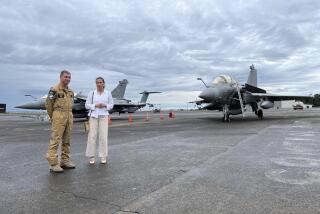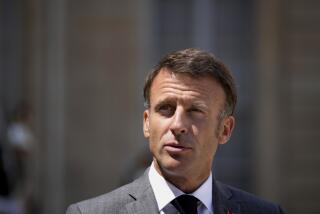France to Give Up Role in Allied Air Patrols Over Iraq
- Share via
PARIS — France on Friday announced that it will no longer take part in allied aerial patrols over northern Iraq--a move again marking France’s political distance from the United States and highlighting a very independent notion of French interests.
Unlike “Operation Provide Comfort,” the original, U.S.-led effort launched in 1991 to protect the region’s Kurdish minority against the troops of Iraqi President Saddam Hussein, the scaled-back mission, to start Wednesday, does not coincide with aid efforts on the ground, the French said.
“The humanitarian element initially provided for in Provide Comfort does not figure in the new mechanism,” the Foreign Ministry said in a communique. “For these reasons, France will not take part in it.”
The announcement in Paris was the latest evidence of the differences that have led to testy, sometimes angry, exchanges between France and the United States in recent months.
It also coincides with extensive French efforts to reestablish commercial and political clout in Iraq, which was subjected to an international trade embargo after Hussein’s invasion of Kuwait in August 1990.
The French have been especially keen to help exploit Iraqi oil reserves, with two companies, Elf Aquitaine and Total, signing three-month contracts for purchases of Iraqi crude this month.
President Jacques Chirac has also been a leading voice in the West for ending United Nations trade sanctions against Baghdad, which he said were punishing innocent Iraqis.
As recently as Wednesday, U.S. officials in Washington were expressing confidence that the French would participate in another six-month extension of aerial operations aimed at barring Iraqi flights over the de facto state created by the Kurds in northern Iraq.
Operation Provide Comfort was started by France, Britain and the United States to protect the Kurds after a failed rebellion against Hussein, when hundreds of thousands of Kurdish refugees fled toward the borders with Iran and Turkey. The French contributed half a dozen warplanes to the operation, based at Incerlik Air Base in Turkey.
French Foreign Ministry spokeswoman Anita Limido said Friday that the main goal of Provide Comfort had been to guarantee the safety of aid flights into northern Iraq by private charities, but that this objective had been superseded by events.
The U.N. “food-for-oil” agreement that took effect this month mandates that 30% of all humanitarian assistance given Iraq go to Kurdish areas, Limido said. So in the French view, the private aid flights and the aerial cover given by Provide Comfort are no longer needed, Limido said.
“The new operation is essentially one of air surveillance,” she said.
Limido predicted that France’s decision would have no effect on “excellent” U.S.-French ties, which have been buffeted since this autumn because of disputes over the North Atlantic Treaty Organization, the United Nations, the Middle East and Africa.
But, anticipating the French decision, an official Iraqi newspaper--Al Thawra, organ of the ruling Arab Baath Socialist Party--said the withdrawal of French planes would show up the new surveillance program, to be carried out by U.S. and British aircraft, as “illegal.”
Friday’s announcement does not affect France’s participation in “Operation Southern Watch” surveillance flights over southern Iraq, the Foreign Ministry communique stressed.
In Washington, the Clinton administration brushed aside the French decision with a mild expression of regret and a pledge to continue enforcing the northern “no-fly” zone regardless of anything Paris might choose to do.
“Coalition air operations over northern Iraq will not be disrupted by the French decision,” the State Department said in a written response.
Times staff writer Norman Kempster in Washington contributed to this report.
More to Read
Sign up for Essential California
The most important California stories and recommendations in your inbox every morning.
You may occasionally receive promotional content from the Los Angeles Times.













